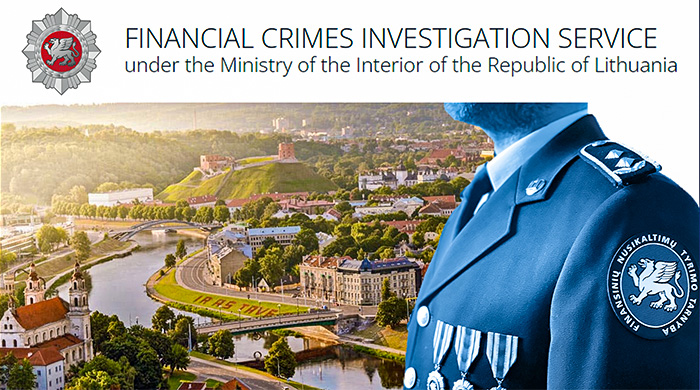Historic fine for crypto firm underscores challenges in enforcing sanctions (11/2024)
Lithuanias Financial Crimes Investigation Service imposed a historic €9.3 million fine on Payeer for violating international sanctions and AML rules. Payeer facilitated transactions through EU-sanctioned Russian banks and failed to verify customer identities, generating €164 million in revenue over 18 months. This case signals increased regulatory scrutiny, a push for stricter compliance measures, and calls for international collaboration to prevent jurisdictional arbitrage. The case underscores the crypto industry’s need to prioritize regulatory adherence amid growing enforcement actions.
✨Get a Dissertation Research Proposal on this Topic
Fill in the form and we will shortly create and send you the research proposal on "Historic fine for crypto firm underscores challenges in enforcing sanctions " for free.

Lets briefly dive into this.
The Financial Crimes Investigation Service (FNTT) of Lithuania has imposed an unprecedented fine of €9.3 million ($10.1 million) on the cryptocurrency payment company Payeer for breaches of international sanctions and anti-money laundering (AML) regulations. This landmark penalty highlights the intensifying scrutiny faced by cryptocurrency firms and the inherent challenges in enforcing global sanctions within the digital asset ecosystem.
Payeer, a provider of cryptocurrency exchange and e-commerce payment services, was found to have facilitated transactions in Russian rubles via European Union (EU)-sanctioned Russian banks. Additionally, the company offered crypto wallet and account management services to Russian individuals and organizations, thereby potentially circumventing international sanctions.
Investigations uncovered that Payeer had acquired a customer base exceeding 213,000 users over an 18-month period, generating revenue surpassing €164 million. The FNTT alleged that Payeer deliberately neglected to implement adequate customer identification and verification procedures, ostensibly to maintain substantial profits.
The company’s operational history revealed a pattern of jurisdictional shifts. After losing its operational license in Estonia, Payeer relocated to Lithuania. This raised concerns about regulatory oversight and the ease with which cryptocurrency firms can exploit jurisdictional loopholes. Further, the company reportedly failed to cooperate with Lithuanian authorities, complicating regulatory enforcement efforts.
The record-breaking fine comprises €8.2 million for violations of international sanctions and €1.1 million for AML non-compliance. This is the largest penalty ever imposed on a virtual asset service provider in Lithuania, setting a significant precedent.
Implications for the Crypto Industry
- Increased Regulatory Scrutiny: Lithuania’s enforcement actions may encourage other jurisdictions to intensify monitoring of cryptocurrency firms, particularly those involved in potential sanctions evasion and AML non-compliance.
- Enhanced Compliance Obligations: Crypto companies may need to prioritize robust Know Your Customer (KYC) and AML frameworks to avoid regulatory penalties and maintain operational licenses, especially in light of emerging regulations such as the Markets in Crypto-Assets (MiCA) framework.
- Jurisdictional Challenges: The ability of cryptocurrency firms to relocate operations highlights the need for enhanced international regulatory coordination to address "regulatory arbitrage." Payeer’s operational trajectory—from Estonia to Lithuania and subsequently Paraguay—underscores this challenge.
- Impact on Crypto Adoption: Stricter enforcement measures could slow the expansion of cryptocurrency services in regions impacted by international sanctions, potentially hindering adoption in specific markets.
Conclusion
The Payeer case exemplifies the critical need for cryptocurrency firms to align with international sanctions and AML standards as regulatory oversight intensifies. Striking a balance between fostering innovation and ensuring compliance will be vital for the industry’s sustainable growth.
About ECEBiS
At ECEBiS you are going to understand what will change the trajectory of the financial industry. You will develop a transversal view on the forces that are shaping the future financial industry.
From payments and lending to investment and money management, tech providers are actively shaping the future of the financial landscape - even pushing the boundaries of currency itself. You might evaluate the impact of robo-advising on health management and examine portfolio recommendations from a diversified set of RAs and attempt to identify the factors behind proposed splits between asset classes.
ECEBiS is a platform in academic research on new business models and innovative products. We investigate in fast moving sectors that are reshaping the financial world of tomorrow and pioneering new ways of doing business. We want to attract outstanding ECEBiS students in finance with experiences and exposures, who intend to
Doctorate of Business Administration (DBA) in Finance (online, 3 years part-time)
develop knowledge on challenges that shape the future of financial industry
engage with a program that offers the convenience of online learning with the benefits of accreditation and global reach.
raise awareness on the importance of fintech and sustainability in finance
identify the best practices in the financial industry to spread positive changes
Go beyond the virtual classroom and network with other ambitious executives and entrepreneurs as you expand your credibility and expertise in the world’s most transformative fields.